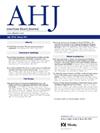DAPAgliflozin for renal protection in heart transplant recipients. Rationale and design of the randomized controlled DAPARHT trial
IF 3.5
2区 医学
Q1 CARDIAC & CARDIOVASCULAR SYSTEMS
引用次数: 0
Abstract
Background and aims
Heart transplantation is the preferred treatment for selected patients with end stage heart failure. Kidney function often declines after heart transplantation. Sodium-glucose cotransporter 2 inhibitors (SGLT2i) slow the decline in eGFR in different populations. However, the effect of SGLT2i on kidney function in heart transplant recipients is unknown.
Methods
The Dapagliflozin for Renal protection in Heart Transplant recipients (DAPARHT) trial is an investigator initiated, double blind, randomized, placebo-controlled trial designed to assess dapagliflozin’s effect on kidney function in heart transplant recipients. Adults heart transplanted at least one year prior to randomization are eligible. Exclusion criteria include an estimated glomerular filtration rate (eGFR) <25 mL/min/1.73 m2, diabetes type I, and contraindication to study medication. Four hundred and thirty patients will be randomized 1:1 to receive 12 months blinded treatment with dapagliflozin 10 mg o.d. or placebo, followed by 24-months open-label treatment. The primary endpoint is the chronic slope of the eGFR from two weeks to 12 months after starting randomized treatment. The open-label phase evaluates dapagliflozin’s long-term effects on kidney function, clinical outcomes, safety, and tolerability. Enrolment began in June 2022. As of December 18, 2024, 300 patients were enrolled. The mean baseline creatinine was 104 ± 28 µmol/L with corresponding eGFR of 66 ± 22 mL/min/1.73 m2. Estimated last patient visit is in September, 2028.
Conclusion
The DAPARHT trial will test whether dapagliflozin improves eGFR slope compared to placebo during one year of follow-up, providing the first randomized evidence of the efficacy of SGLT2i in heart transplant recipients.
Trial Registration
Dapagliflozin for Renal protection in Heart Transplant recipients (DAPARHT), NCT05321706, clinicaltrials.gov.
dapag列净对心脏移植受者肾脏的保护作用。随机对照DAPARHT试验的基本原理和设计。
背景和目的:心脏移植是终末期心力衰竭患者的首选治疗方法。心脏移植后肾功能经常下降。钠-葡萄糖共转运蛋白2抑制剂(SGLT2i)可减缓不同人群中eGFR的下降。然而,SGLT2i对心脏移植受者肾功能的影响尚不清楚。dapag列净对心脏移植受者肾脏保护(DAPARHT)试验是一项研究者发起的、双盲、随机、安慰剂对照试验,旨在评估dapag列净对心脏移植受者肾功能的影响。在随机分组前至少一年接受成人心脏移植的患者符合条件。排除标准包括估计肾小球滤过率(eGFR) < 25 mL/min/1.73m2、糖尿病I型和研究药物禁忌症。430名患者将按1:1的比例随机分配,接受12个月的达格列净10mg od或安慰剂盲法治疗,随后进行24个月的开放标签治疗。主要终点是开始随机治疗后2周至12个月eGFR的慢性斜率。开放标签期评估达格列净对肾功能的长期影响、临床结果、安全性和耐受性。招生于2022年6月开始。截至2024年12月18日,共有300名患者入组。平均基线肌酐为104±28 μmol/L,相应的eGFR为66±22 mL/min/1.73m2。估计最后一次就诊是在2028年9月。结论:DAPARHT试验将在一年的随访期间测试达格列净与安慰剂相比是否能改善eGFR斜率,为SGLT2i对心脏移植受者的疗效提供首个随机证据。
本文章由计算机程序翻译,如有差异,请以英文原文为准。
求助全文
约1分钟内获得全文
求助全文
来源期刊

American heart journal
医学-心血管系统
CiteScore
8.20
自引率
2.10%
发文量
214
审稿时长
38 days
期刊介绍:
The American Heart Journal will consider for publication suitable articles on topics pertaining to the broad discipline of cardiovascular disease. Our goal is to provide the reader primary investigation, scholarly review, and opinion concerning the practice of cardiovascular medicine. We especially encourage submission of 3 types of reports that are not frequently seen in cardiovascular journals: negative clinical studies, reports on study designs, and studies involving the organization of medical care. The Journal does not accept individual case reports or original articles involving bench laboratory or animal research.
 求助内容:
求助内容: 应助结果提醒方式:
应助结果提醒方式:


